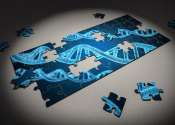Monkey studies reveal possible origin of human speech
Most animals, including our primate cousins, communicate: they gesture, grimace, grunt, and sing. As a rule, however, they do not speak. So how, exactly, did humans acquire their unique talent for verbal discourse? And how ...
Jul 23, 2018
0
67









